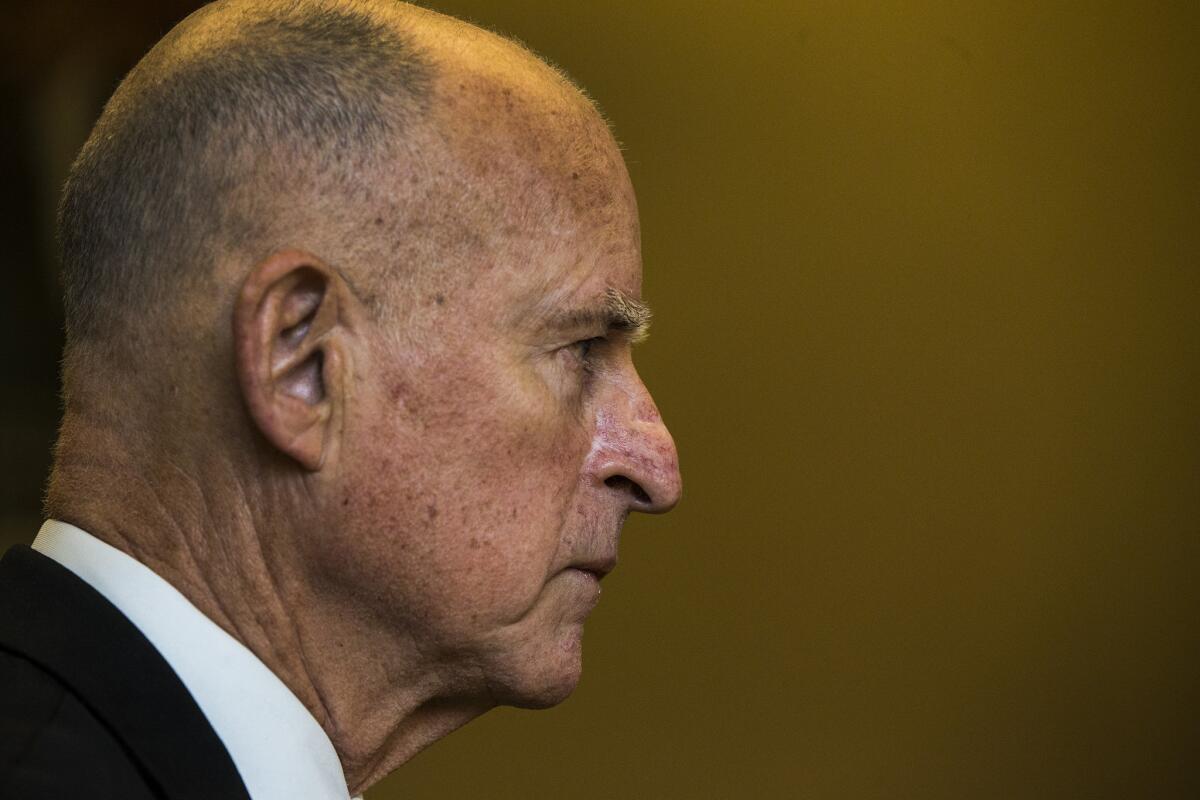For Jerry Brown, end-of-life bill forces personal reflection

Gov. Jerry Brown, who signed legislation to help terminally ill patients end their own lives, pondered his own death when considering the measure.
- Share via
Reporting from Sacramento — As someone deep into his eighth decade of life, and with multiple brushes with cancer under his belt, death is not an uncommon topic for Gov. Jerry Brown.
Often it’s a source of humor, such as in May when he ruminated on the pointlessness of pursuing perfect solutions in an imperfect world.
“It’s messy, there’s suffering, and in the end we all die,” Brown said in a speech to a business group. “When you’re 77, by the way, that’s something that’s a little more imminent.”
But on Monday, when the governor revisited the topic of death, it was far more personal and consequential. As he signed legislation to help terminally ill patients end their own lives, Brown said his decision came down to one question.
“In the end,” he wrote in a statement, “I was left to reflect on what I would want in the face of my own death.”
Brown continued, “I do not know what I would do if I were dying in prolonged and excruciating pain. I am certain, however, that it would be some comfort to be able to consider the options afforded by this bill. And I wouldn’t deny that right to others.”
Cancer has been a recurring issue for the governor. He had a small basal cell carcinoma removed from near his right ear in 2008, and in 2011 he had a cancerous growth removed from his nose.
In the year after that, Brown was treated for early stage prostate cancer. When treatment ended, the governor told reporters: “I’m ready. I’m rarin’ to go. Don’t expect me to leave too soon.”
Brown’s own health experiences seem to have been on his mind when he considered the aid-in-dying legislation -- he wrote that he discussed the issue with two of his own doctors.
There’s another reason the governor’s decision was a personal one. When Brown was young he planned to become a priest and studied at the Jesuit seminary in Los Gatos. Although he dropped out, his religious background continues to play an important role in his political life, and the Catholic Church strongly opposed the legislation.
In his statement, the governor said the spiritual questions came into consideration while discussing the issue with a Catholic bishop.
“I have considered the theological and religious perspectives that any deliberate shortening of one’s life is sinful,” he said.
Besides a bishop, Brown also spoke with Brittany Maynard, the Californian woman who traveled to Oregon to end her life after she was diagnosed with brain cancer. She died days after their conversation.
Brown’s statement, unusually personal in nature, caused ripples throughout California on Monday. Elizabeth Wallner, 51, who has cancer in her liver and lungs and is considering seeking drugs that would end her life, said she appreciated the governor’s position.
“I’m really grateful for him putting himself out there and taking a stand,” she said.
Times staff writer Patrick McGreevy contributed to this report.
Follow @chrismegerian for more updates from Sacramento.
For more political coverage, go to www.latimes.com/politics.
More to Read
Get the L.A. Times Politics newsletter
Deeply reported insights into legislation, politics and policy from Sacramento, Washington and beyond. In your inbox three times per week.
You may occasionally receive promotional content from the Los Angeles Times.











